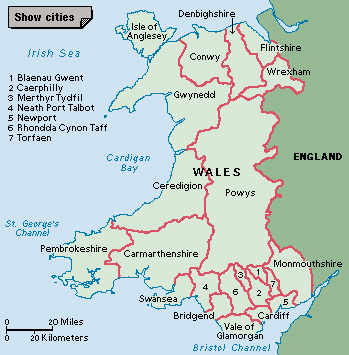Wales, Government of. Wales is one of four divisions of the United Kingdom, which is both a parliamentary democracy and a constitutional monarchy. The monarch is the head of state, but the prime minister and a cabinet of senior politicians govern the country. For historical reasons, Wales is called a principality (country ruled by a prince). The reigning monarch of the United Kingdom usually gives the title Prince of Wales to his or her eldest son, the heir to the throne (see Prince of Wales ).
Wales is one of three devolved areas in the United Kingdom—that is, areas where certain powers and responsibilities have passed from the central British government to the regional governments. The other two devolved areas are Northern Ireland and Scotland. Wales has a parliament of its own that controls many matters that were previously under the direct control of the British government. Welsh voters approved the creation of a national assembly in a referendum on Sept. 18, 1997. The British Parliament passed the Government of Wales Act 1998 in that year, creating the framework for the National Assembly for Wales. The Assembly took power on July 1, 1999. The National Assembly became known as the Welsh Parliament, or Senedd Cymru, in 2020.
British Parliament and Cabinet.
In the British Cabinet, the secretary of state for Wales represents Welsh interests during the formation of national policy and legislation. The secretary of state’s office is called the Wales Office. The secretary of state is also responsible for representing Welsh interests in the British Parliament and for transferring the annual budget, in the form of a block grant, from the British Treasury to the Welsh Parliament.
Wales elects a small number of the 650 members of the House of Commons, the lower house of the British Parliament. There are two Welsh committees in the House of Commons. The Welsh Grand Committee is made up of all 40 members of Parliament from Wales and up to 5 members nominated by the Parliament’s Committee of Selection. The Welsh Grand Committee considers all bills relating to Welsh matters under the jurisdiction of the British Parliament. The Welsh Affairs Select Committee, which has 11 members, holds inquiries on spending and administration in the Wales Office.
Senedd Cymru, the Welsh Parliament.
In addition to representation in the British Parliament, Wales has its own parliament in Cardiff. The Welsh Parliament, commonly known as the Senedd, has 60 members who serve four-year terms. Forty of the 60 members of the Senedd are constituency members, representing specific areas. They are elected by the first-past-the post, or simple majority, system. Each voter has one vote, and the candidate within each constituency with the most votes is the winner, even if he or she does not have an overall majority.
The remaining 20 Senedd members are elected on a regional basis. There are five electoral regions, and each region sends four members to the Senedd. The members are chosen by an electoral system called the Additional Member System (AMS). AMS is a form of proportional representation, which awards each political party a share of the seats in proportion to the share of the votes it received (see Proportional representation ).
A first minister, nominated by the Senedd and appointed by the reigning British monarch, heads the Welsh Cabinet. The first minister nominates Senedd ministers, and the monarch approves the nominees. These ministers make up the remainder of the Cabinet. Senedd ministers are responsible for particular areas of policy, such as health or education. The first minister assigns these responsibilities. Each minister’s area of responsibility has a committee to monitor the minister’s work.
There are four regional consultative committees for Wales: (1) North Wales, (2) Mid Wales, (3) South West Wales, and (4) South East Wales. The committees are made up of the Senedd members for each region. They hold meetings in the regions to consult with regional interest groups and report back to the Senedd.
Devolution.
Although the British Parliament retains its right to make laws for Wales, the Welsh Parliament now legislates for certain matters. These matters are called devolved issues. In 1999, the Welsh government received the power to pass secondary legislation. This means that the British Parliament decides the primary legislation, which is the broad outline of the law. The Welsh Parliament then decides on the details, in a form called statutory instruments. In 2007, the Welsh government also gained authority to pass some primary legislation for Wales in specific cases that are first approved by the British Parliament. There are specific devolved powers within the areas of agriculture, education, environmental issues, health, housing, social services, and local government.
Reserved issues are those areas controlled by the British Parliament and government. These issues include taxation, overall economic policy, defense, international relations, broadcasting, and the justice system.
The concurrent issues (shared powers between the Welsh government and the British Parliament) include certain areas of the economy, such as promotion of investment in Wales, Welsh exports, and the Welsh language.
The Joint Ministerial Conference (JMC) is a forum that brings together officials of the British government and the administrations of Northern Ireland, Scotland, and Wales. Officials meet to discuss issues and compare policy on matters of common interest. These include health, antipoverty programs, technology, and international developments. The JMC can also be asked to settle disputes if there are disagreements about which administration has authority for an issue.
Local government.
Wales is divided into 22 unitary authorities. Each unitary authority has its own elected council. The councils deal with such matters as education, housing, recreation, and roads. As in England and Scotland, local government is subject to national law and policy, and it has no independent lawmaking power. Council tax (local tax) and national grants provide the funding for local government.

